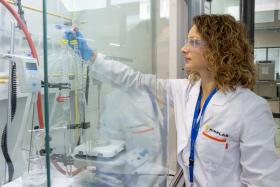The plastics industry to use enzymes to improve the sustainability of its processes

AIMPLAS is carrying out the ENZPLAST project, supported by the Valencian Institute of Business Competitiveness (IVACE), whose main objective is developing new processes more sustainable for the manufacturing, recycling and composting of plastics.

Supported by the Valencian institute of business competitiveness (IVACE) and cofounded by EU ERDF funds within the 2014-2020 ERDF Operational Programme for the Valencian Region, the ENZPLAST project pursues three objectives: the first one is related to the challenge of implementing synthetic routes to obtain plastics safer for the health of people and eco-friendlier. For that purpose, enzymes will be used instead of metal catalysts, which have an associated toxicity. Furthermore, these solutions involve other clear advantages in the polymerization process, since they require reaction temperatures lower than those required when using conventional catalysis and they minimize the use of organic solvents with the subsequent reduction in emissions.
Secondly, a procedure to use it in the recycling process is being developed, in which enzymes will be incorporated in the washing stage to remove its odour and its efficiency in the separation of multilayer materials will be studied, which are currently relevant challenges. In this sense, the type of industrial sectors to benefit from this innovative solution (dairy, meat and fish wastes) has been established, determining the families of key compounds that produce odour problems. In this way, we will be able to select the most suitable enzymes or groups of enzymes with criteria.
Finally, the effectiveness of different enzymes in the biodegradation process for several different bioplastics is being studied. For this, the selected enzymes will be added into the biodegradation process both under aerobic and anaerobic digestion conditions.